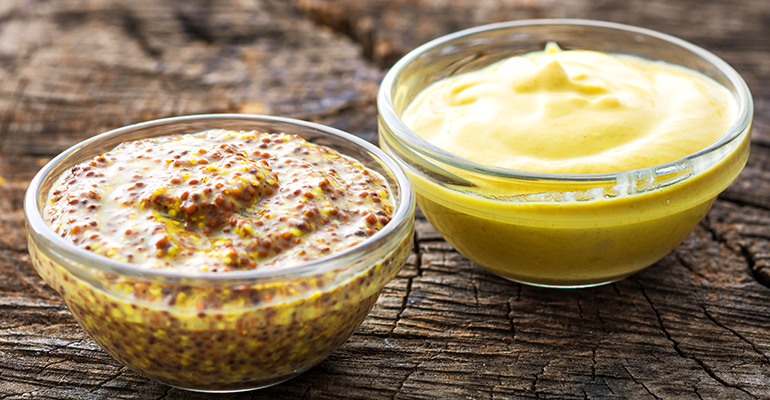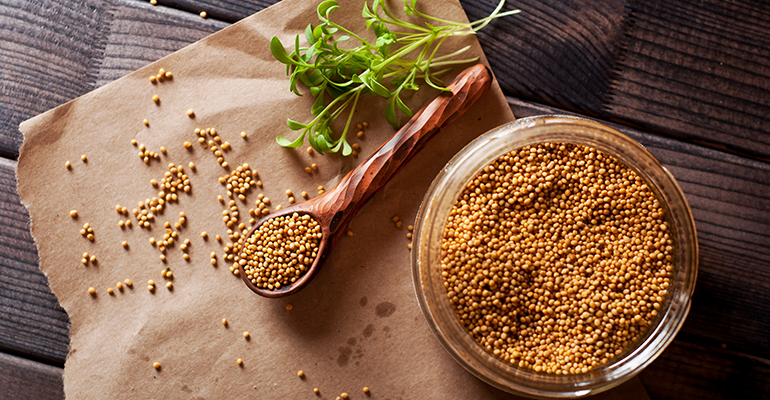News
Climate change fuels France’s mustard shortage
10 Oct 2022
Droughts and the Ukraine conflict are fuelling a shortage of Dijon mustard in France, the world’s biggest consumer of the condiment, and could hit consumers particularly hard in the run-up to Christmas.
France is currently in the midst of a Dijon mustard shortage and consumers are facing the prospect of going without the condiment in run up to Christmas. “The main issue is climate change,” says the director of the Burgundy Mustard Association.

The country is having to adapt to limited supplies of the mustard, which has seen brands like Unilever-owned Amora and Maille disappear from supermarket shelves, much to the frustration of the French consumer.
“The main issue is climate change and the result is this shortage,” says Luc Vandermaesen, director of mustard manufacturer Reine de Dijon.
“We can’t respond to the orders we get, and retail prices are up as much as 25% reflecting the soaring cost of seeds,” he adds.
Vandermaesen, believes that global warming has been responsible for a 50% reduction in seed production in 2021, not in the Burgundy region, but in Canada’s Alberta and Saskatchewan provinces, where the brown mustard seeds are grown and sourced.
The Canadian Ministry of Agriculture has noted harvests have fell by 30% from 2021 to 2022, restricting exports.
Meanwhile, wet weather has placed a dampener on France’s own mustard seed harvests with yields falling short of expectations for three consecutive years.
Also contributing to the issue is the conflict in Ukraine, where Russia is the world's second largest exporter of mustard seeds in the world.
However, these seeds are mainly the yellow variety and not the brown seeds (Brassica Juncea), used to make Dijon mustard.
Retail issues: Supermarkets deny they are stockpiling
Vandermaesen, who is also president of the Burgundy Mustard Association, believes that a restricted supplies of these yellow seeds has increased pressure on the mustard market pushing up prices.
Combined with the supply chain fallout from Covid-19 and rising energy and production costs, it’s not surprising that French mustard makers have struggled to supply the condiment to retailers.
The situation is serious enough for French supermarket giants Carrefour to deny that it was stockpiling the mustard to push up prices.
“Since the global shortage of mustard, we have organized ourselves with our European partners to continue to offer it to our customers in our stores in France,” the chain said in a series of tweets.
“As soon as we have products in warehouses, we do our best to get them to stores as quickly as possible. Some of them, like Dijon mustard, are nevertheless more complicated than others to supply.”
“The number of Carrefour stores and the consumption of mustard being much higher in France, it is normal that there is sometimes less stock than in our other European countries.”
 © AdobeStock/chattenoir
© AdobeStock/chattenoir
Driving factors: Droughts and conflicts
In a similar move, French supermarket Intermarché attached signs to shelves, highlighting “a drought in Canada” and the Russian-Ukraine conflict as reasons behind the shortage.
According to Vandermaesen, every French person consumes an average of one kilogram of mustard per year, making the country the largest consumer of the condiment.
The uproar over its scarcity has highlighted Dijon mustard’s dependence on external factors for its production.
With the country’s love for Dijon mustard and its historical link to the region, there have been calls for its production to be localised once again.
In an interview with French newspaper Le Monde, Paul-Olivier Claudepierre, co-owner of French mustard producers Martin-Pouret described the mustard shortage as “an opportunity, a tremendous boost.”
“It's an opportunity for the agricultural sector to reshore production, and for the public to realize the absurdity of the situation.
“We grow a seed thousands of miles away that we harvest, ship to the port, and send it across the ocean in a container to end up processing it here. It's expensive, and just look at the carbon footprint!"
The Association of Producers of Mustard Seeds in Burgundy (APGMB) is an organisation of mustard growers set up to do just that in 1997.
More recently, it called on the European Partnership for Innovation (EIP) to help fund research looking into the challenges of sustaining a local association for Burgundy mustard for an international market.
"As far as we know, there is almost no production of mustard in Dijon itself, save a very small amount," says Sophie Mauriange of the Institut National de l'Origine et de la Qualité (INAO).
"There are no rules keeping the production of Dijon mustard in [the city of] Dijon. You can make it anywhere in the world."
